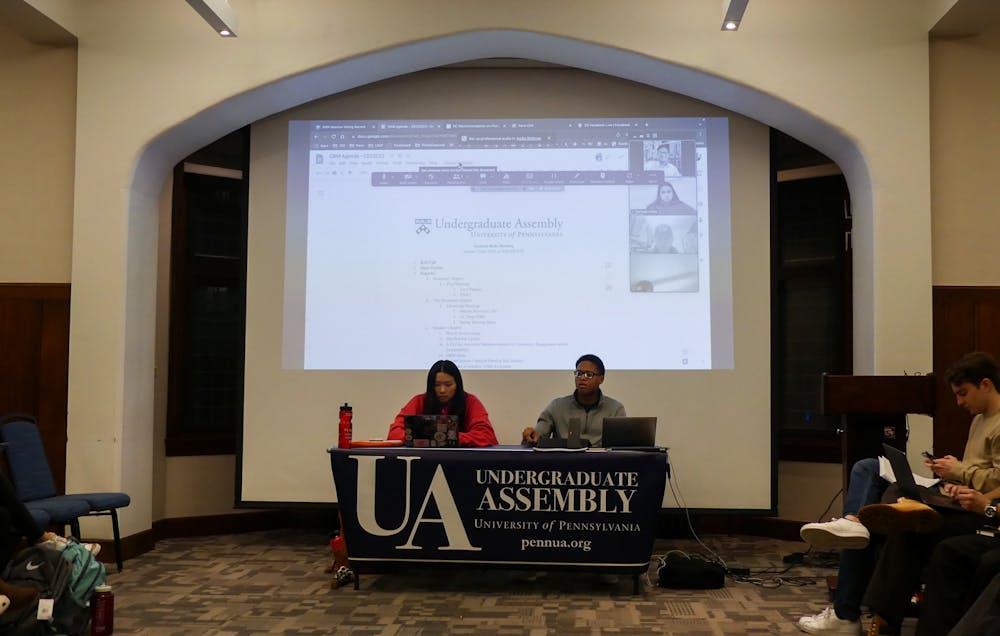
The Undergraduate Assembly released its annual report on May 9, offering insight to what the assembly worked on during its 50th session.
The report outlines the UA members' work during the 2023-23 school year in order promote transparency, hold the UA accountable to the student body, and encourage feedback on how to better represent students. This year's report summarizes new amendments to the assembly's bylaws, projects related to the UA president and vice president's platform initiatives, and coverage of meetings with administrators, as well as a number of reports from UA leadership.
In his "Letter from the President," UA President and 2023 College and Wharton graduate Carson Sheumaker defined the work of the UA as advocacy work. He described the UA's efforts as particularly crucial this year, with the University hiring many new administrators.
"The route we took this year focused on working collaboratively with our peers and administrative partners, to find common ground that could produce tangible progress," Sheumaker wrote.
The report also included executive reports written by the outgoing vice president, speaker, treasurer, secretary, and communications team. Other UA members contributed to the report, covering a range of topics relevant to the University, such as academic initiatives and equity and inclusion.
During the 2022-23 academic year, seven changes were made to the UA bylaws related to position eligibility, attendance requirements, and budget portions. The changes also included changes to the reserve fund, where all UA-allocated money not spent in the previous fiscal year will be held. One of the changes will require future amendments to the bylaws to be approved by a two-thirds majority vote.
This year's successful projects include a student headshot photo booth in Career Services, a proposal prohibiting professors from assigning work due over academic breaks, and increasing the dining dollars available to residential advisors. The Hill Menstrual Product Pilot Program was successful in providing free menstrual products in Hill College House for the year, and the Penn Period Project secured $11,000 in funding.
Regarding these projects, Sheumaker and UA Vice President and rising College senior Alex Eapen explained that "members completed project work by forging partnerships with administrators in numerous areas of University operations."
"Because of the great work done by the members of the 50th session, we have a lot of momentum going into year 51," they wrote.
Next year, students can expect to see pilot programs related to free CPR training and certification, a new Sophomore Transfer Critical Writing Seminar, a permanent vigil space garden on Memorial Walk, and a program expanding the current medication offerings and distribution methods from Student Health Service.
Other actions by the UA this past year include a joint resolution between the UA and GAPSA that establishes student trustee seats on the University Board of Trustees, and a focus on intergroup collaboration between steering groups to address student needs. The Disabled Coalition and the FGLI Dean's Advisory Board were also added as steering groups for the first time.
An ARCH Steering Committee was established with representatives from each of the 7B groups, which was accompanied by an expansion of cultural resource centers in the ARCH building.
During budget season, the UA allocated more than $3 million across student groups, changing budgets that were historically allocated specifically for the Social Planning and Events Committee, the Student Committee on Undergraduate Education, and the Nominations and Elections Committee. Additionally, the UA focused on funding goals that worked toward underrepresented groups.
The contingency fund guidelines were also updated, allowing greater funding requests from a wider range of student groups.
Sheumaker and Eapen described these changes as "great strides in internal operations," and said that these improvements will "make us more productive in the future."
"We look forward to continuing to review and refine UA operations to ensure we can best serve the student body," they said.
Regarding the University Council, which acts as a broadly representative forum related to all University activities, "the undergraduate delegation had an unprecedented level of involvement in Council proceedings this year," Eapen said in the report.
One way the report encourages greater transparency is through the inclusion of a section covering all meetings between UA membership and the administration, which includes information about which administrators were met with and what was discussed in the meetings.
The report concludes with a directory including the contact information of the UA cabinet and members. "We are committed to working to improve the student experience at Penn, and we welcome any and all feedback that students wish to provide," the report read.
The Daily Pennsylvanian is an independent, student-run newspaper. Please consider making a donation to support the coverage that shapes the University. Your generosity ensures a future of strong journalism at Penn.
Donate







